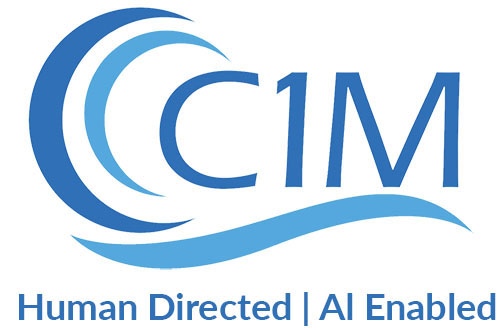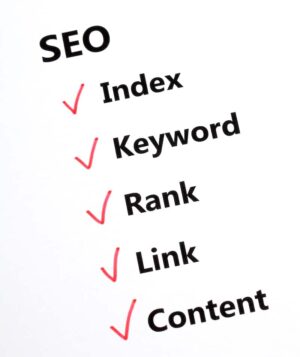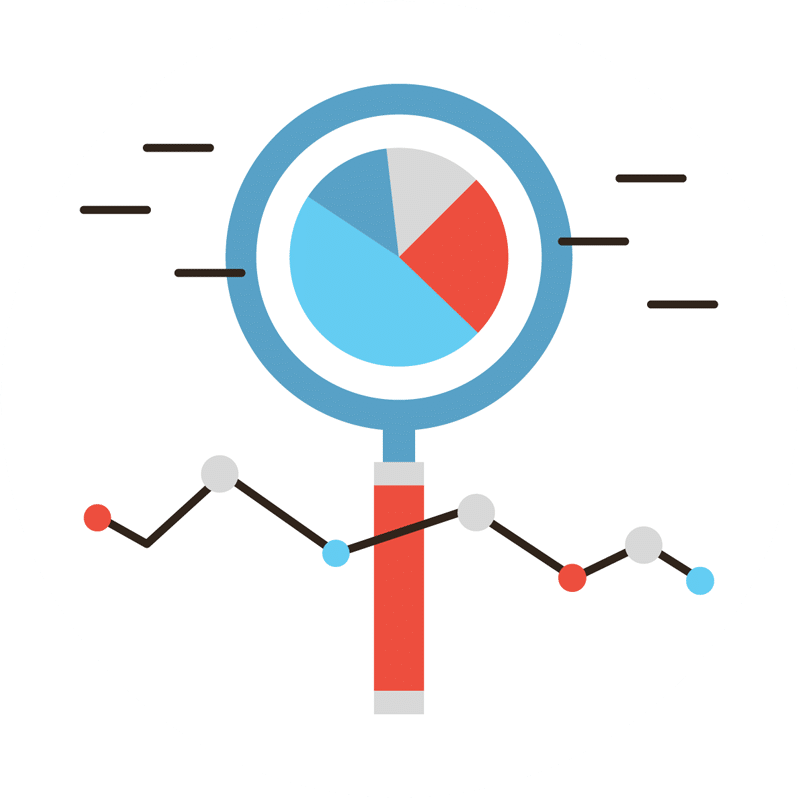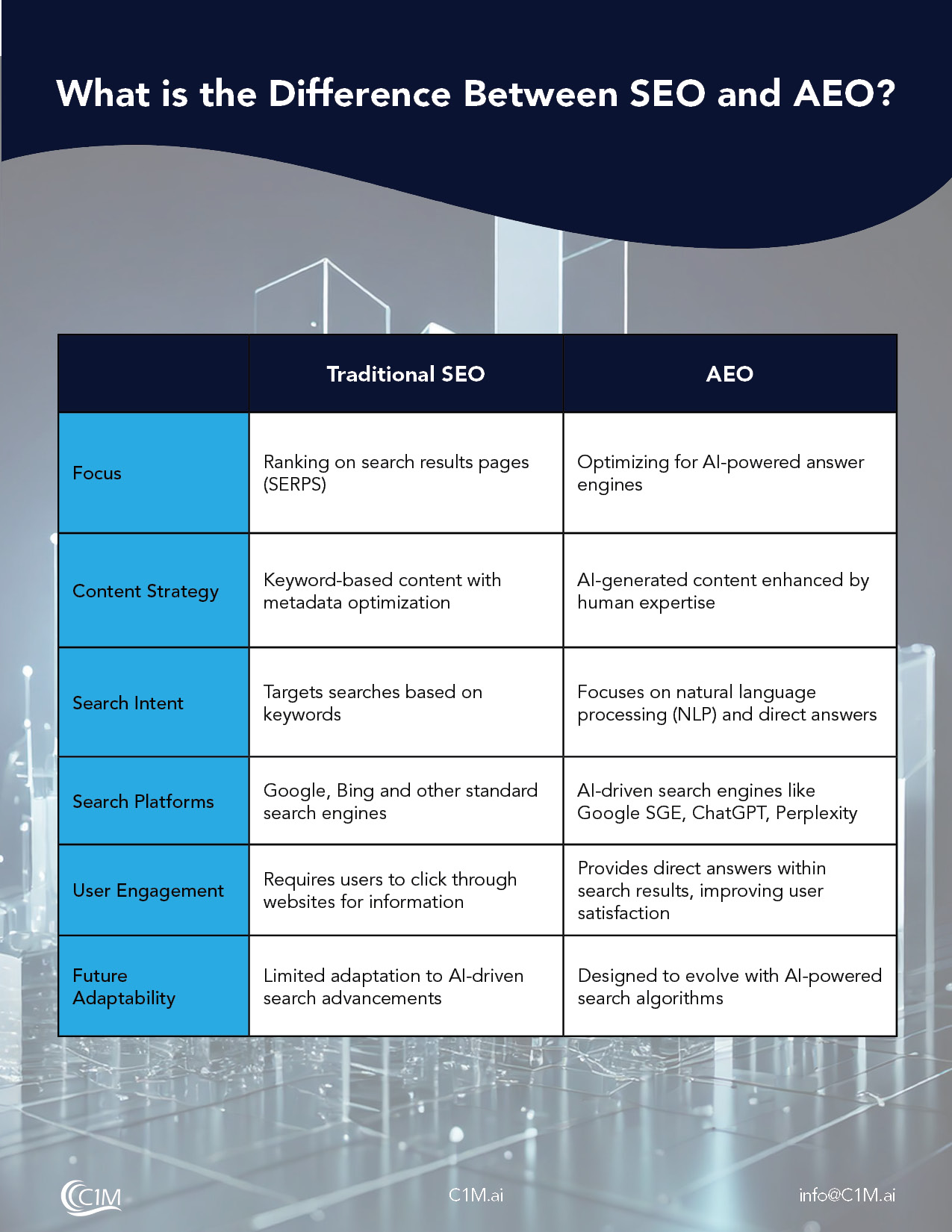
Over the last two years, we have seen a major shift in the way consumers are searching for products and services. What was once a world of window shopping, billboards, and Sunday ads has now been replaced with a computer or smartphone and a search bar. Even the most traditional businesses realize that their target audience is now sitting behind a screen. Moreover, companies are making an accelerated shift to create their own footprint in this digitally driven consumer market.
Company websites are being created every day, with vibrant colors and with enhanced features. Mom and pop shops are learning how to create and maintain social media accounts to stay in touch with their followers. Mass emails are being sent in larger numbers more than ever before. However, some businesses struggle to reel in organic traffic, connect with their audience, and maximize the chance for sales conversions.
What are they overlooking? What’s the missing link? What’s the secret that other successful businesses are keeping to themselves?
The answer lies in these three letters- SEO. This is a term nearly synonymous with the word visibility in the digital world. If you don’t know how to make your company visible in a crowded digital space, then even the biggest and best marketing efforts will be unsuccessful.
Search Engine Optimization is a strategy that aims to make your website stand apart and above all the others by driving organic search results. However, it is much more than just another marketing tool. It is the foundational focus of all business marketing efforts.

What is SEO?
SEO stands for Search Engine Optimization. If we take those three words for what they are, this is what SEO is all about. Search engines are what produce the results people are looking for online, and optimization means that something is working in the best way possible. Together, SEO is about optimizing your website rank and be visible among the top results on a search engine results page (SERP).
The more visibility your pages have in search results, the better. This means you are more likely to attract and gain the attention of potential customers for your business. There are a lot of factors that are evaluated in a split second every time a search takes place, so making sure your content checks as many boxes as possible, as quickly as possible, is vital to the position your page lands on SERPs.
These top SERP positions are so important, in fact, that some businesses are willing to pay to ensure their placement on that first page. Following the ad results are the regular, or organic, results on the search rankings page. The SEO process aims to increase a business’s organic search results by driving promising leads and traffic to the site.
This is usually more valuable to the site because organic search traffic is usually high-quality traffic because users are actively searching for a specific topic, product, or service for which a site might rank. If a user comes across a site in this way, as opposed to a paid ad, it can lead to better brand engagement.
By using SEO, marketers effectively tell search engines what their website is about and why it should rank well on search engine results pages. To do this, there are three core components that SEO is based on. The following points should be considered when conducting research for SEO for a brand.
- What types of content do search engine users and your customers want or need?
- How do search engines work to discover, index, and serve content in search engine results pages?
- How can you properly promote and optimize your website to tell search engines more about it?
Why is SEO Important for Your Business?
SEO has a significant impact on your company’s performance. SEO provides organizations the visibility they need to attract customers during this digital era. 81% of customers and 94% of B2B buyers will perform search queries online before they make a purchase. Zooming in on this statistic more, 30% of clicks will go to position one on the SERP, 12% to position three, and 2% to positions nine and ten.
These numbers clearly indicate that brands desiring attention from online customers need to boost their organic search rankings. Brands that do not have a strong online presence will find themselves falling behind in the competition.
The digital ecosystem is quickly becoming an essential part of the sales funnel for nearly all businesses, regardless of size or experience. SEO is a critical component to the online success of the business. It’s important that brands pay attention to SEO to ensure that their organizations have a strong presence and are ready to engage the modern customer online. Learning SEO and how you can maximize its impact on your business is more important now than ever.
How Do Search Engines Work?
Major search engines help people find what they’re looking for online. Whether researching a product, looking for a restaurant, or booking a getaway, search engines are a common starting point when you need information. Search engines do the work of pulling the best results out of the billions of bits of information on the internet that best matches your search.
There is so much information to scan over, that search engines have come up with ways to cover a wide range of data in the most effective and efficient way possible. Your SERP is not created by chance. There are data calculations that happen almost instantaneously every time a search bar is utilized.
Search engines perform three primary functions:
Crawling
When someone performs a search, search engines, such as Google, scour the internet for highly relevant content by looking over the code, or content, for each URL they find. The crawlers follow internal and external links found on each page to understand what each page is about.
Indexing
Google, and other search engines, store and organize the content found during the crawling process. The filing or storing of this content is called indexing. Once a page is indexed, it’s in the running to be displayed as a result of relevant searches.
Ranking
Pulling from this indexed content, search engines then order this content and show it on a SERP in hopes of solving a searcher’s query. The way that they order the search results is called ranking, and results are displayed by most relevant to least relevant. This means that the top results on the SERP are most likely to be able to answer your question or fulfill your search.
How Do Search Engines Use SEO?
When a user types or speaks a query into the search box, the search engine uses complex algorithms to pull from all the content available with what it believes to be the most accurate and useful list of results. Those results make the SERP and can include web pages of text, news articles, images, videos, local business listings, etc.
Search engine algorithms are a complex system of calculations used to retrieve data from its search index and instantly deliver the best possible results for a search. The idea of SEO is to create content that will align with the factors that search engines use to match results to the query.
These factors can be summed into five key categories:
- Meaning of the query
- Relevance of webpages
- Creating quality content
- Usability of webpages
- Context and settings
In its earliest days, only a handful of updates were made to these algorithms. Now, these factors are constantly evolving to keep up with changing user behaviors, and thousands of changes are made every year. Most of these updates are so small that they go completely unnoticed. On other occasions, the search engine rolls out major algorithmic updates that significantly impact SERP.
It’s important to regularly check your site’s web traffic through an analytic platform and search ranking for your target keywords. It’s crucial to stay well-informed and learn about SEO basics continuously.
Marketers must constantly evaluate and optimize SEO basics in order to keep up with what strategies are currently effective and which tactics need to be improved. Good SEO takes much more than just building links, creating content, and adding a few keywords here and there.
Search engine marketing professionals should track and understand:
- Emerging trends
- New features in search related products and tools
- Technological advancements
- Your audience
SEO Keyword Research
The first step in search engine optimization is to identify terms people are searching for, or keywords, that you think will best match the words typed into the search box by users. Keyword research is foundational in enabling you to identify relevant keywords and phrases to target.
As marketers perform keyword research, these questions should guide the process:
- What are people searching for?
- How many people are searching for it?
- In what format do they want that information?
Key factors to consider when determining the keywords, you want to target on your site include:
- Search volume
- Relevance
- Competition
Businesses should focus keyword research on keywords that receive high search volume to be relevant for search engines. Looking at a competitor’s top-performing keywords also gives you an idea of how to adjust your strategy to compete with them.
Keyword Targeting Best Practices
There is a difference between the keywords you would like to achieve high rankings and the keywords that actually rank high on search engines. This should be the driving force behind your keyword strategy.
Consider the following when researching keywords.
Align keywords with business goals
- Brand awareness
- Demand generation
- Lead generation
Use keyword match types
- Broad match
- Broad match modifier
- Phrase match
- Exact match
- Segment keywords
- Filter out unwanted keywords
- Find new keywords
On-Page SEO
After you have your keyword list, the next step is to incorporate your targeted keywords into your site’s content. This process ensures that your website content is relevant to users. On-page SEO basics include using the right keywords or phrases in the headings and body of the copy. Making sure that website material is relevant to users also includes meta descriptions, internal and external links to other reputable sites, and decent URL focus keyword.
On-page optimization includes:
- Title tags
- Meta description
- Body content
- Thick and unique content
- Engagement
- Shareability
- Alt attributes
- URL structure
- Schema and markup
Writing SEO Content for Blogs
Blogging helps boost SEO quality by positioning your website as a top contender on SERP. Writing optimized blog posts for both users and search engines is a skill and takes time and practice. Search Engine Optimization blog writing can also be time-consuming and challenging. You must be smart about identifying your writing topics that will keep your readers engaged. Paying attention to the rules of SEO, including meta descriptions, can ensure that you have written a well-optimized blog post with great, quality content that will rank higher in a search.
Some ways to optimize blog writing for SEO include:
- Identify the target audience for your blog
- Conduct keyword research
- Add visuals
- Write a catchy title
- Include an enticing CTA (Call to Action)
SEO Tools
Incorporating SEO best practices into your content strategy will take time. As your website grows, so will your search engine goal. Once you can identify the goals and intent of your target audience, you’ll be on track to deliver relevant content that will climb higher in the ranks of the SERP.
Additionally, there are tons of marketing tools that have been developed to help improve, manage, and report on the effectiveness of SEO. Marketers use them to research, develop strategies and measure the results of ranking higher on SERPs.
Effective Marketing Tools
- SEMrush
- Google Analytics and Search Console
- Yoast SEO
- Ahrefs
- SpyFu
- HubSpot Website Grader
- Google Trends
- Bing Webmaster
- Consultants
Marketing consulting teams, such as C1M has SEO experts that know how to build an effective strategy for your business. Expert consultants can help develop the right strategies and execute or recommend an SEO plan and report on the metrics to evaluate success.
Optimizing your SEO Strategy with C1M
Regardless of the industry or business size, SEO is the most viable and cost-effective way to reach customers through organic search results. The challenge is that search engines are always updating their algorithms to provide quality search results. This means that to keep up, Search Engine Optimization is a fast-paced and evolving field.
Optimizing your website’s overall search engine traffic depends on the development and constant evaluation of your brand’s SEO. It can be challenging to keep up with current search tactics and remove those that aren’t working from your search marketing plan. SEO is a long-term project, with daily action, and constant activity.
You can confidently improve your website management with our professional marketing experts at C1M. We have the experience and expertise to optimize your SEO strategy and move your company in the direction of success. SEO could be your missing link. Let’s work together to focus your SEO strategy to achieve greater organic search results that are more likely to convert into sales and profits.
You can expand your business by using SEO and C1M is ready to assist you in achieving your goals.








